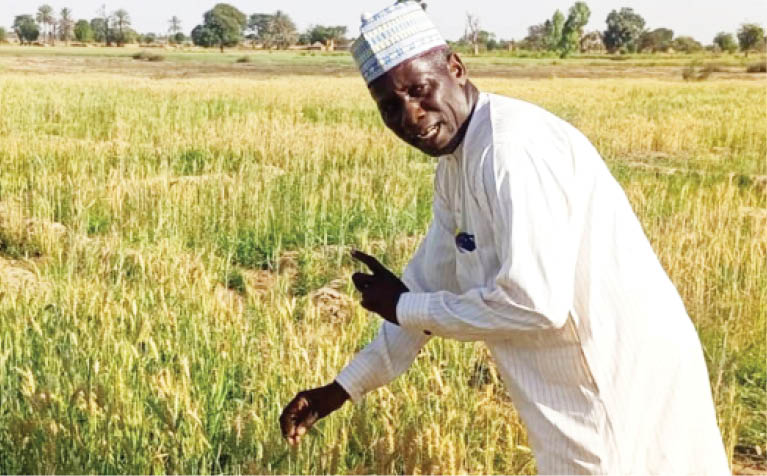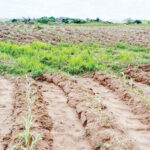Wheat and rice farmers in Jigawa State are lamenting the situation of their farms due to cost of fertiliser.
Jigawa, one of the major producing states had become the first in rice harvest and second in wheat, but this year’s production may witness low harvest due to inadequate fertiliser.
Garba Barau, who has been cultivating wheat for over 10 years, said he used to get up to 20 bags (1.5 to 2 metric tonnes) of wheat every season, but that is likely to change.
He lamented that two years ago, his yield dropped, due to inadequate and cost of fertiliser. He called on the government to provide fertiliser for farmers at an affordable price.
“Two years back, my harvest reduced to 10 and 15 bags because I could not afford to buy fertiliser. Government should please provide affordable fertiliser for us so that life will be better,” he said.
Yabagi Sani: Resilient presidential candidate defying odds
Farmers sue Bauchi govt over 10,000ha of allocation
Musa Adamu, also a wheat farmer who has spent more than 17 years in the business, said that in the past years he used to get over 20 bags of wheat, but now, the amount of the commodity has dropped to 10 bags, and sometimes 15 in a season. He lamented that things were getting harder due to inflation and cost of living. He said he has five hectares but due to lack of fertiliser he could only cultivate one.
“If you want to start wheat farming you must have fertiliser and money at hand. I have been doing this for about 17 years now. My harvest used to be around two metric tonnes, which is about 20 bags of wheat, but it dropped to 10, and if you are lucky, sometimes 15 bags par harvest because inflation and cost of living is too high. I initially wanted to cultivate five hectares for wheat alone but because of the high cost of fertiliser and non availability of funds, I did just a hectare,” he said.
Isyaku Yusuf decided to diversify to other crops to mitigate the impact the cost of inputs may have on his income. He now cultivates varieties of crops such as rice and onions.
Yusuf said he had spent 15 years in farming business, where he got married, had children, built a house and bought a car.
He lamented that during the wet season, flood destroyed his farm investment, causing him to lose a lot of money.
He said that before a local small-scale farmer would start rice and wheat farming, he or she must get a sprayer, fertiliser and other farming equipment. He called on the government to assist farmers.
Another rice and wheat farmer from Hadejia Local Government Area, Ibrahim Abubakar, said that in the past, he used to get 32 bags of rice and 22 bags of wheat during harvest.
He said the major challenges facing farmers centered on the cost of fertiliser, insecticides, sprayers, fuel and other farming equipment, which reduce productivity. He added that in the last two years, farm outputs had been on the decline.
Imamu Saleh from Gatafa in Hadejia Local Government said he cultivated varieties of crops during the dry season, including wheat, rice and tomatoes.
He said farming had become a very costly venture, adding that in Nigeria, one must have money to start. For him, fertiliser is the major challenge because not every farmer can afford a bag of the commodity because of its cost.
A rice farmer, Abba Ibrahim, said government should intervene, particularly in inputs because they are recording a lot of every year.
Ibrahim said he had been farming for over 15 years and recorded a lot of success in the past, but today, the cost of input makes it very difficult.
For Hassan Umaru Hadejia, a rice farmer, one of the challenges is the unpredictability of the cost of input because “everything skyrocketed in Nigeria within a short time,” making planning and serving difficult.
Daily Trust on Sunday learnt that wheat takes about four months to mature, but when it comes to making a decision about the right time to harvest, the farmer has to know when the crop is at a premium. If the weather has been dry and hot, the harvest will be quicker.
When the crop has dried to a golden yellow colour and there is no more visible green in it, the farmer breaks the head off a plant and ‘rubs it out’ between his hands. The grains of wheat are released and he can then bite them – if they are hard, the crop is ready to go.
The farmer then makes a tentative booking with the workers he used when he planted the wheat four months ago.
Those with larger farms also tend to have on-site storage so that if enough trucks are not available when it is time to harvest, the grain can be stored on the farm.

 Join Daily Trust WhatsApp Community For Quick Access To News and Happenings Around You.
Join Daily Trust WhatsApp Community For Quick Access To News and Happenings Around You.


